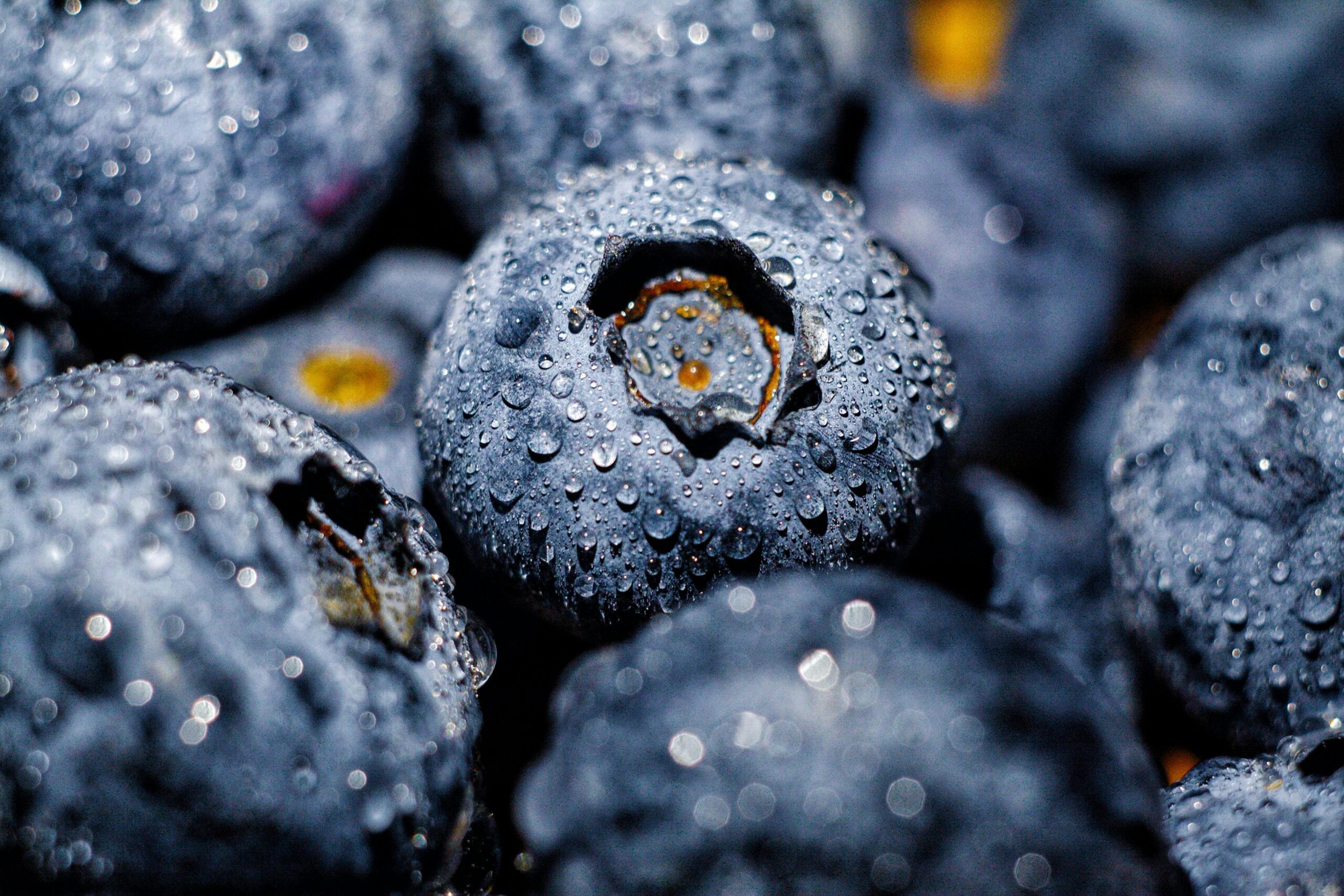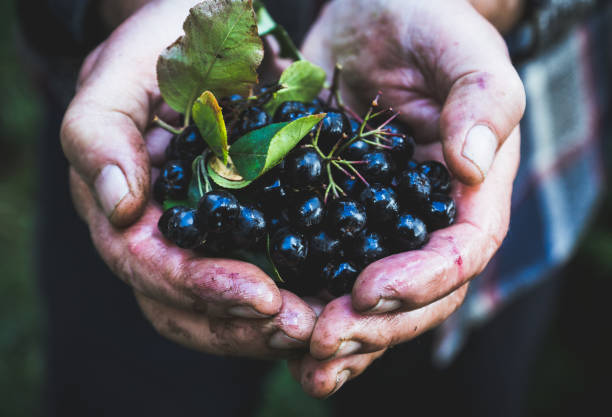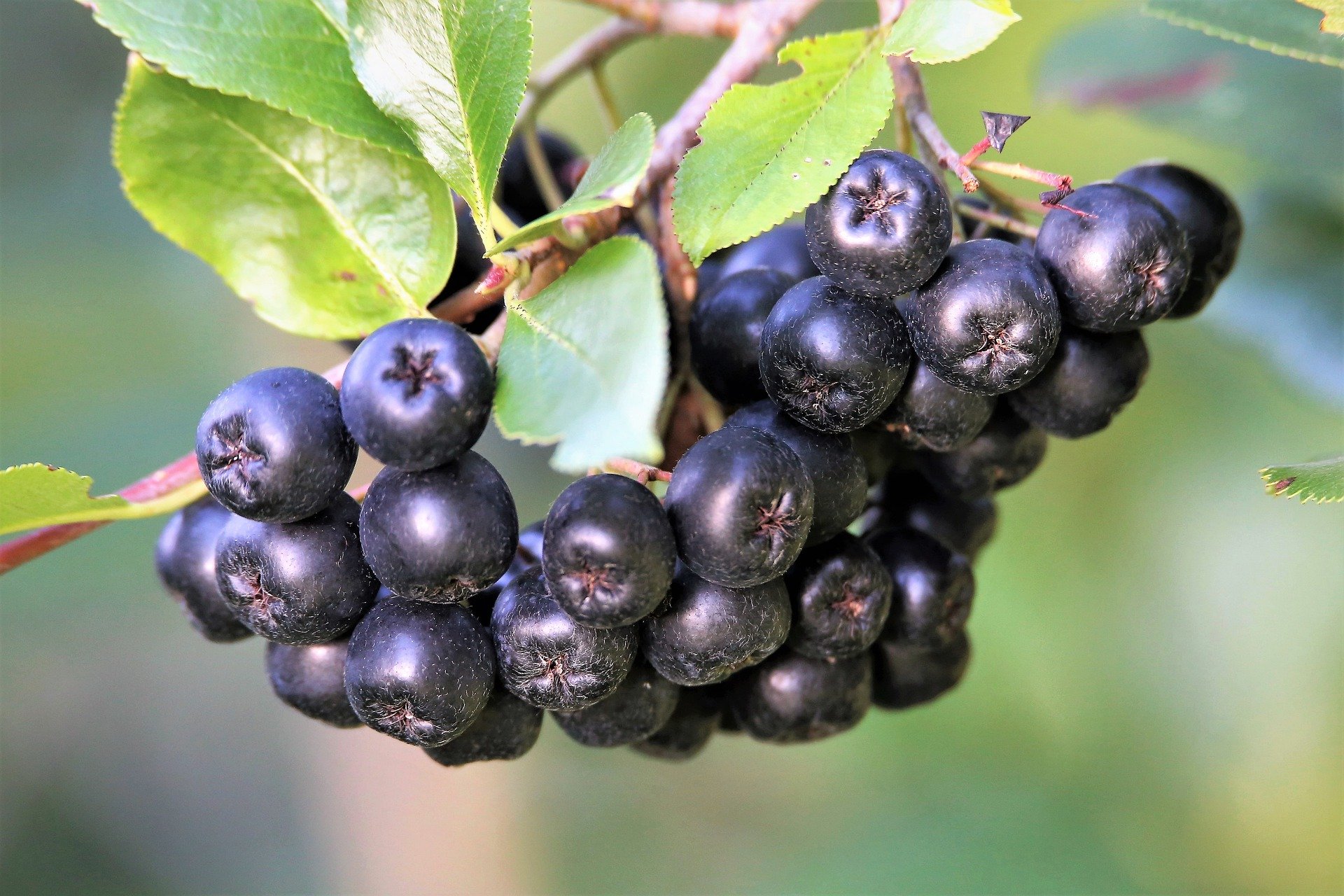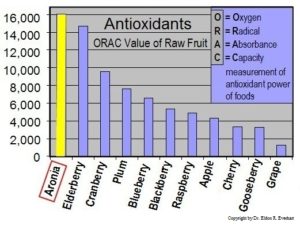Health Benefits of Aronia Berry (Aronia Melanocarpa)
The Aronia berry is one of the most antioxidant-rich superfoods in the world. Packed with polyphenols, calcium, iron, and vitamins A, B2, B6, B9, C, E, and more. Aronia may help manage chronic conditions and prevent illness.
Native to the midwest, the fruits of Aronia melanocarpa have been used by Native Americans for medicinal purposes. The Aronia Berry was used by tribes as a supplement in their diet as well as an herbal remedy for colic, scrapes, boosting the immune system and as a treatment for a variety of other health related ailments.
Immune Health
We all know the immune system is our body’s defense system against invaders such viruses and bacteria. However, something you might not know is how that the immune system is absolutely critical to normal bodily functions like digestion, regulating blood pressure, and managing chronic inflammation. Having a healthy immune system is not just about defending your body from nasty invaders, but also about overall health of every organ system.
Fortunately, consuming foods in our diet that support and possibly enhance immune function is impactful; making great choices about what we put in our bodies can help us function better and be more healthy. Such foods include berries packed full of compounds that improve cell function, ability to handle stress, and recovery from stress.
Even the pigmentation that gives color to berries, some of which are called anthocyanins, are seen to have health benefits. Anthocyanins have a high amount of biological activity in inflammatory-related diseases such as cancer [1], diabetes [2], and cardiovascular disease [3]. Examples of common anthocyanin-rich sources include blueberries, elderberry, and cherries. Anthocyanins have been found to lower a pro-inflammatory protein complex and suppress the transmission of viruses in cells and shows promise as a potential nutraceutical treatment for influenza. The darker the color berry is the better.
We all know elderberries, blueberries, and cranberries are touted for their health benefits. The Aronia berry stands out among the rest. Due to its notably dark purple pigmentation, indicating its dense anthocyanin content, which is estimated to be the highest plant content of anthocyanin measured to date!
Anti-inflammatory Benefits
Aronia has demonstrated its powerful anti-inflammatory effects in various ways. One way this has been shown is with the chronic digestive disorder colitis. Aronia appears to directly stimulate a type of immune protein called IL-10, which is vital to keeping excess intestinal inflammation at bay. This berry has also shown to produce a mild but significant reduction in blood pressure, a symptom of what’s called “low-grade inflammation”. The reduction of this low-grade inflammation was explained by Aronia’s ability to decrease the inflammatory biomarkers IL-4, IL-5, and tumor necrosis factor-α in a 16-week human trial.
Antiviral and Antibacterial Properties
Aronia has also been shown to exhibit antibacterial and antiviral properties with its impressive anti-inflammatory abilities. An interesting speculation regarding aronia’s antibacterial properties is that it has shown to inhibit the growth of many different types of bacteria, while at the same time illustrating a lower potential for bacteria to develop resistance to it in comparison to some antibiotics. Aronia has exhibited its antiviral properties against two types of the influenza virus: seasonal and oseltamivir-resistant. Impressively, it was able to inhibit nearly 70% of both types of virus.
Heart Health
Daily supplementation with Aronia reduces blood pressure and cholesterol, according to a new meta-analysis published in the Journal of Dietary Supplements.
The researchers conducted a literature review of controlled trials evaluating the effects of daily aronia berry supplementation for an average of 6-8 weeks on total cholesterol and blood pressure. They evaluated systolic blood pressure, diastolic blood pressure, and total cholesterol.
The study found that blood pressure and total cholesterol were significantly reduced, effects that were most significant in adults over the age of 50. The study concludes: “Supplementation with aronia berry is a safe and effective way to reduce total cholesterol and systolic blood pressure.
Lipids
You know sometimes when folks tell you something is good for you, you think, yeah right? It’s just hype to sell more. I know think that until I look into it myself or know someone it’s really helped. I know people it has helped lower their cholesterol.
Hyperlipidemia characterized by an increase in low‐density lipoprotein (LDL) cholesterol and a decrease in high‐density lipoprotein cholesterol is one of the major risk factors for atherosclerosis and cardiovascular disease. Plant foods with high contents of phenolic phytochemicals are reported to be inversely correlated with plasma total cholesterol (TC) and LDL cholesterol. Aronia melanocarpa fruits are remarkably rich in phenolic substances. They are used for human consumption as juice, syrup, jam, powders and wine. Research demonstrated that Aronia melanocarpa fruit juice hindered the dietary‐induced elevation of plasma TC, LDL cholesterol and triglycerides in rats. In view of the results from this experiment, we imagine the juice may be further tested for reducing hyperlipidemia in humans and possibly approved a valuable dietary supplement.
One study discussed the benefits of our little purple powerhouse berries in the fight to lower cholesterol. The study was done with rats. However, we have a friend who swears by Aronia Berries. She was struggling with high cholesterol and hesitated to use lipid lowering medications because of side effects. She tried Aronia, just a small handful daily. Her only diet change was adding berries daily to her cereal, oatmeal, or yogurt. Her cholesterol was 30 points lower at her re-check!
Side effects? None. Plus she had the benefit from the anti-fungal, anti-viral antioxidant properties of Aronia. Good enough reason to try? You bet.
Cancer
Aronia berries may protect against cancer. Test-tube and animal studies show that the anthocyanins in Aronia berries may stop the growth of colon cancer cells. One test-tube study found that 50 mg of Aronia extract reduced colon cancer cell growth by 60% after 24 hours.
Similar experimental studies, indicating that chokeberry extract seems to induce cell death and curb invasiveness in brain cancer, as well as other research, highlighting the potential therapeutic effects of particular polyphenols found in green tea, soy beans, grapes, mulberries, peanuts and turmeric, show potential.
Dr Harcharan Rooprai, King’s College Hospital, comments: “The promising results seen are encouraging and suggest that these polyphenols have great therapeutic potential not only for brain tumours but pancreatic cancer as well.”
Glucose Regulation
Diabetes is a global pandemic which warrants urgent attention due to its rising prevalence and economic burden. Many alternative therapies are being researched for anti-diabetic properties, given the inefficacy of current medicinal treatments. From this perspective, Aronia melanocarpa or black chokeberry has been investigated for its therapeutic properties in many studies, especially for its ability to combat hyperglycemia-induced oxidative stress and the macrovascular complications of diabetes including cardiovascular disease. Though Aronia melanocarpa is native to the eastern areas of North America, it has been planted extensively in Europe and Asia as well. Several in vivo studies have displayed the antioxidant properties of Aronia melanocarpa berry juice and plant extract in rat models where oxidative stress markers were observed to have significant reductions. Some of the potent bioactive compounds present in the fruits and other parts of the plant were identified as (-)-epicatechin, chlorogenic acid, neochlorogenic acid, and cyanidin-3-galactoside.
Overall, Aronia melanocarpa could be considered a good source of antioxidants which is effective in combating hyperglycemia-induced oxidative stress.
Aronia vs. Elderberry
Perhaps the closest berry in comparison to the Aronia Berry is the Elderberry. Elderberry is more well-knownthan Aronia, yet as we all struggle through COVID, cold and flu seasons, the hunt is on for holistic remedies to boost the immune system or shorten the duration and the severity of the illness. Both Aronia Berry and the Elderberry do provide some supplemental benefits to a well-balanced diet and help maintain a state of health and wellness. However, there are differences between the two berries and the better option overall appears to be the Aronia Berry for its higher antioxidant benefits.
Though the Elderberry is the closest to the Aronia Berry in flavonoids and polyphenols, the antioxidant fighting compounds of the Elderberry still don’t quite measure up to Aronia on the USDA Oxygen Radical Absorbance Capacity or ORAC Scale. 100 grams of the Elderberry scaled in at 14,697 on the ORAC value scale, while 100 grams of the Aronia Berry scaled in at a whopping 16,062 on the ORAC value scale.
Both the Aronia Berry and the Elderberry provide excellent sources of fiber, Vitamin A and Vitamin C. However, the Aronia Berry tops the Elderberry as a great source of potassium, iron, zinc and magnesium as well. The Aronia Berry offers a better make up of vitamins and minerals the body needs to maintain optimum health and wellness.
Like the Aronia Berry, the Elderberry is grown primarily in North America and Europe. The state of Missouri produces the largest crop of Elderberries in the world, while Iowa is the largest producer of Aronia Berries in the United States, and Poland the largest overall producer of Aronia Berries in the world
The branches, leaves, and twigs of the Elderberry contain trace elements of cyanide making them unfit for human consumption. The branches, leaves and twigs of the Aronia Berry, on the other hand, are edible and have been used in teas and even in some concentrates for their rich antioxidant benefits.
Side effects of the Elderberry can occur with immunosuppressant drugs and autoimmune diseases such as Lupus, Rheumatoid Arthritis or Multiple Sclerosis. Elderberry can cause the immune system to become more active thereby increasing the symptoms of autoimmune diseases. Elderberries are known to act as diuretics and not recommended for people with kidney issues. Elderberries are also not recommended for pregnant or nursing mothers and can exacerbate reactions in people allergic to honeysuckle. In preliminary studies being done at this time, there have been no known side effects from taking the Aronia Berry.
With the coming cold and flu season and the push for more holistic home remedies to give a boost to the immune system, both the Aronia Berry and the elderberry may offer some form of supplemental assistance. However, given the comparison of the two, my money is still on the Aronia Berry for the a higher boost in antioxidant elements, and while the two berries have their similarities, there’s still no denying the health and
wellness benefits inherent in the “power of purple”.
The “Power of Purple” has been evident in our household. While one of us got the flu, the other who is more faithful with his consumption did not. Coincidence? I think not.
Should I plant Aronia for my family?
Absolutely! The plants can be purchased in garden centers, online, and through seed catalogs. We prefer the Viking variety for its heavy fruit production. The plants grow similar to an old-fashioned lilac bush, starting out almost as a twig and in a few years topping 10′ tall and 4-5′ in diameter. Plant your Aronia in a place where it will get full sun most of the day and adequate drainage. They aren’t terribly picky and will grow in heavy clay soils too, just not produce quite as well. However, they do not like to be wet.
How long before I see berries?
After planting your Aronia bushes, you will see a very few berries after the second year. To get a good crop, it will take three years. Bushes will continue to produce fruit annually with 4-20 lbs per bush depending on your situation and maturity.
Conclusion
Aronia’s time has come. With all the health benefits being studied and looking very promising and with the chart-topping ORAC score, isn’t it time you tried Aronia? Visit MyAroniaBerry.com to find certified organic Aronia berry products. We’ve mixed healthy Aronia with A2 Goat Whey & Elderberries to give you outstanding options to boost your health without all the man-made chemicals.
Sign up for our newsletter to learn more about the health benefits. We won’t send you tons of junk mail, only the good stuff!
Remember, I can’t make any specific claims as to the curative effects of our products. The information given is drawn from research done by many individuals in many studies.




